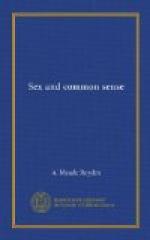Again, an increasing number of us believe that to master our physical impulses is possible; and that it has seemed impossible—at least, for men—in the past largely because so little knowledge and so little common-sense has been used in achieving mastery. Naturally, it was simpler to assume that it was impossible to control oneself than to find out how to make it possible, but as we grow more civilized we cease to be perfectly content with this simple plan, and begin to perceive its extraordinary injustices and brutalities. It has been said that the civilization of any people or period may be judged by the position of its women, and though this is too simple to be quite true, it is far more true than false. If, however, civilization does raise the position of women, and assign to them a greater freedom of action and a wider scope for their lives than was theirs before, it must be clearly understood that women in these circumstances and of this type will take a quite different line on the question of sex morals than their great-grandmothers did. It is, for example, still urged that women must not do this, that or the other work, because it involves working with men whose sex instincts may be uncontrollably aroused by such collaboration. Sir Almroth Wright has pleaded this, and it is being urged to-day against the entrance of women into what is now almost the only sphere still closed to them—the spiritual work of the Churches. It is urged that some men are afraid of being sexually excited if they are addressed by a woman-preacher, and that others cannot be within the sanctuary, with a woman near them, without similar danger. The misunderstanding that arises here is, surely, that the cause of this abnormal excitement is in the woman, whereas (in the cases cited) it is in the man. There are, of course, women who find an exactly similar difficulty in working with men:




